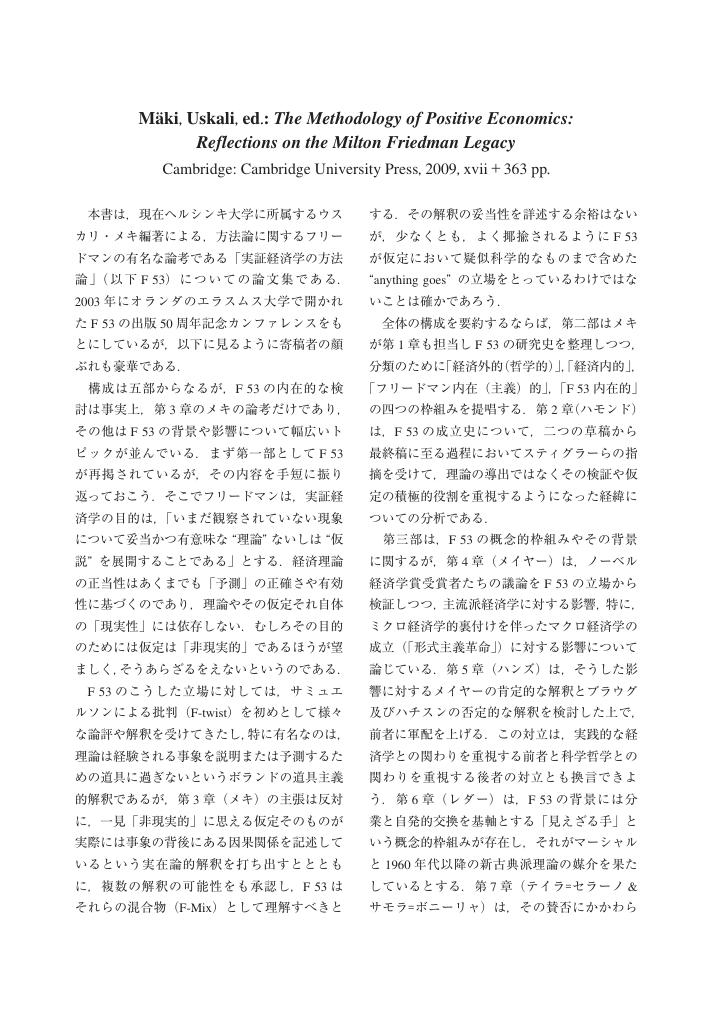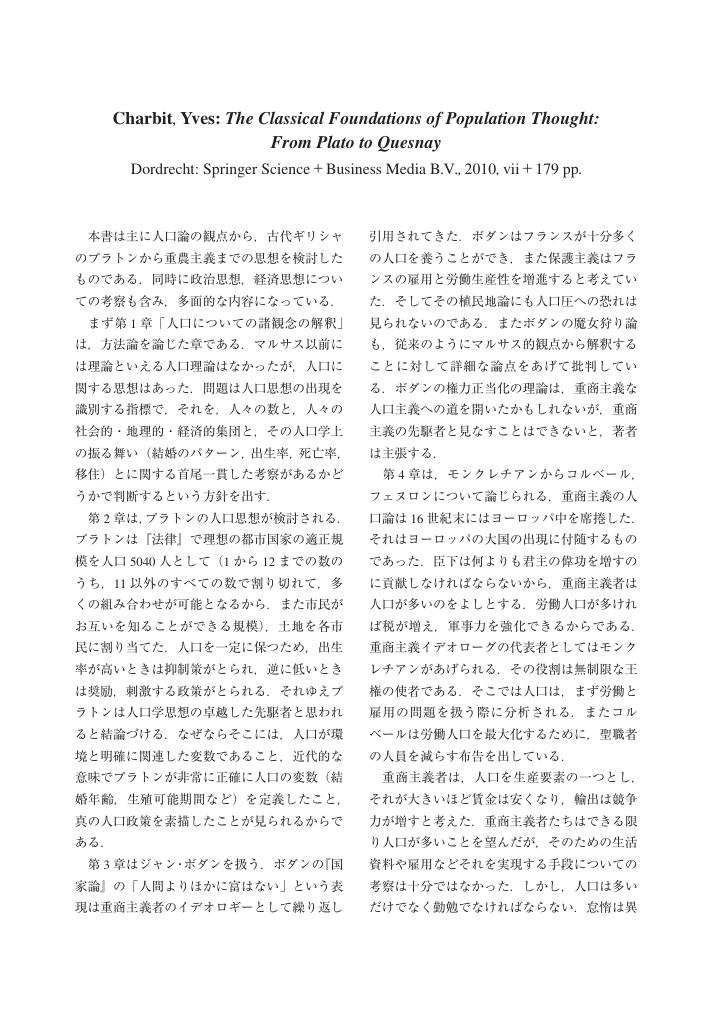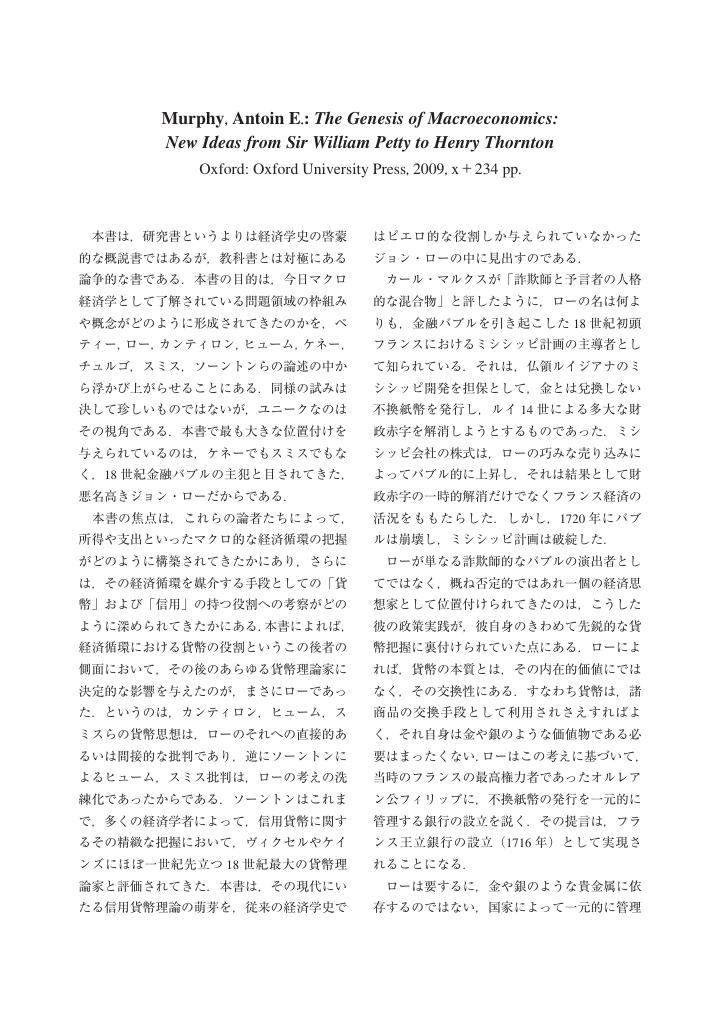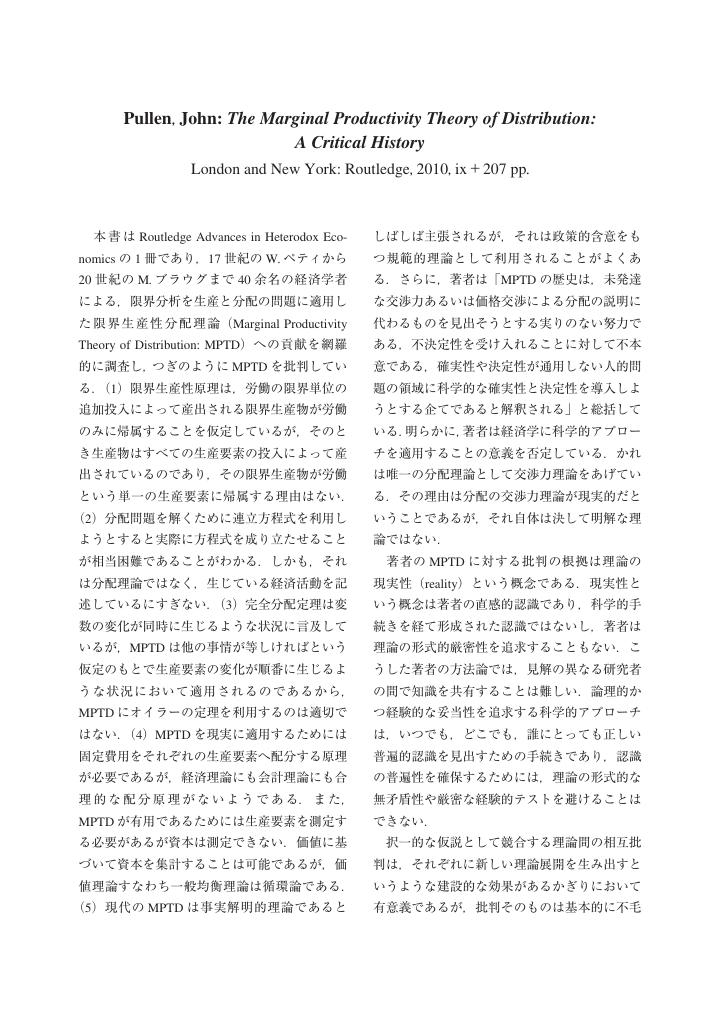1 0 0 0 OA J. E. ケアンズのアイルランド問題論 土地所有権問題を中心に
- 著者
- 刘 鑫
- 出版者
- 経済学史学会
- 雑誌
- 経済学史研究 (ISSN:18803164)
- 巻号頁・発行日
- vol.54, no.1, pp.61-82, 2012 (Released:2019-08-22)
This paper examines the classical economist John Elliot Cairnesʼs analysis of “the Irish prob-lem.” In particular, it focuses on the land proper-ty rights issue in Ireland. This study examines John Stuart Millʼs analysis of the Irish problem, although Mill was influenced by Cairnesʼs view on this issue. However, research on Cairnesʼs analysis of the Irish problem is extremely scarce. Therefore, this paper is significant in that it closely examines Cairnesʼs analysis. In this paper, the following two issues are discussed. First, Ireland faced several problems related to population, religion, and national inde-pendence. This paper deals with the reason that Cairnes paid the utmost attention to the land ownership problem. Secondly, by comparing Cairnesʼs view with that of Mill, can we clarify the characteristics of Cairnesʼs analysis? Cairnes emphasized the difference between land and other commodities, promoting the establishment of a system of land ownership appropriate to the Irish condition. Moreover, he criticized the lais-sez-faire policy: he advocated that it was neces-sary for the government to intervene in land ownership issues. Cairnesʼs criticism of the lais-sez-faire policy had an impact on Mill. This pa-per highlights Cairnesʼs view on the importance of institutions in solving economic problems. JEL classification numbers: B12, B31.
- 著者
- 若田部 昌澄
- 出版者
- 経済学史学会
- 雑誌
- 経済学史研究 (ISSN:18803164)
- 巻号頁・発行日
- vol.53, no.2, pp.112-113, 2012 (Released:2019-10-30)
- 参考文献数
- 2
- 著者
- 生垣 琴絵
- 出版者
- 経済学史学会
- 雑誌
- 経済学史研究 (ISSN:18803164)
- 巻号頁・発行日
- vol.53, no.2, pp.114-115, 2012 (Released:2019-10-30)
1 0 0 0 OA López, G. Julio and Michaël Assous: Michal Kalecki. Basingstoke: Palgrave Macmillan, 2010, x+258 pp.
- 著者
- 鍋島 直樹
- 出版者
- 経済学史学会
- 雑誌
- 経済学史研究 (ISSN:18803164)
- 巻号頁・発行日
- vol.53, no.2, pp.116-117, 2012 (Released:2019-10-30)
- 著者
- 太子堂 正称
- 出版者
- 経済学史学会
- 雑誌
- 経済学史研究 (ISSN:18803164)
- 巻号頁・発行日
- vol.53, no.2, pp.118-119, 2012 (Released:2019-10-30)
- 著者
- 篠原 久
- 出版者
- 経済学史学会
- 雑誌
- 経済学史研究 (ISSN:18803164)
- 巻号頁・発行日
- vol.53, no.2, pp.120-121, 2012 (Released:2019-10-30)
- 著者
- 平野 嘉孝
- 出版者
- 経済学史学会
- 雑誌
- 経済学史研究 (ISSN:18803164)
- 巻号頁・発行日
- vol.53, no.2, pp.122-123, 2012 (Released:2019-10-30)
- 著者
- 井上 義朗
- 出版者
- 経済学史学会
- 雑誌
- 経済学史研究 (ISSN:18803164)
- 巻号頁・発行日
- vol.53, no.2, pp.124-125, 2012 (Released:2019-10-30)
- 著者
- 齋藤 隆子
- 出版者
- 経済学史学会
- 雑誌
- 経済学史研究 (ISSN:18803164)
- 巻号頁・発行日
- vol.53, no.2, pp.126-127, 2012 (Released:2019-10-31)
1 0 0 0 OA 星野彰男『アダム・スミスの経済理論』関東学院大学出版会, 2010年, xi+217頁
- 著者
- 新村 聡
- 出版者
- 経済学史学会
- 雑誌
- 経済学史研究 (ISSN:18803164)
- 巻号頁・発行日
- vol.53, no.2, pp.128-129, 2012 (Released:2019-10-31)
- 著者
- 髙 哲男
- 出版者
- The Japanease Society for the History of Economic Thought
- 雑誌
- 経済学史研究 (ISSN:18803164)
- 巻号頁・発行日
- vol.53, no.2, pp.1-20, 2012 (Released:2019-08-22)
- 被引用文献数
- 2
Abstract: Adam Smithʼs social theory analyzes and interprets both the unfolding and accumula-tive structures of human nature and society, while considering the foundation of hu-man instinct. My reinterpretation makes it possible to achieve a coherent understand-ing of The Theory of Moral Sentiments and The Wealth of Nations, and to recognize the commonalities among Smith, Hume, and Darwin with respect to the viewpoint of evolutionary point of view. Smithʼs concept of “instinct” is distinctly biological; it differs obviously from Lockeʼs philosophical concept and Humeʼs psychological one. There is no doubt that Smith followed Locke and Hume in terms of his empirical understanding of human knowledge and ways of thinking; nonetheless, Smith remained convinced that ani-mals had instincts-that is, they are born with innate programs. As shown in his de-tailed descriptions in “Of the External Senses”-including those of instinctual per-ception among the young of the partridge, the goose, and suckling animals, as well as worms that have no head but yet search for food-Smith came to this idea through elaborate direct observations and indirect observations via the work of Linnaeus. For Smith, the human species incorporates the instincts of self-interest (self-preserva-tion) and mutual altruism (sociability, the propensity to exchange). This understand-ing is maintained without any change from that outlined in the “Letter to Authors of the Edinburgh Review” to that in the sixth edition of The Theory of Moral Sentiments. JEL classification numbers: B 10, B 31, B 41.
1 0 0 0 OA A Reappraisal of Jevons's Thought on Labour
- 著者
- 岡田 元浩
- 出版者
- The Japanease Society for the History of Economic Thought
- 雑誌
- 経済学史研究 (ISSN:18803164)
- 巻号頁・発行日
- vol.53, no.2, pp.21-40, 2012 (Released:2019-08-22)
- 被引用文献数
- 4 4
Abstract: This paper re-examines W. S. Jevonsʼs thought on labour and elucidates its unique-ness and limitations. Jevonsʼs subjectivist approach penetrated his theory of labour, and he regarded pain as the measure of labour. In the first edition of The Theory of Political Economy, Jevons provided insights that could lead to the negation of the market determination of wages and other work conditions, thus offering a rationalisation of the interven-tion of socio-political factors in labour exchange. In doing so, Jevons distinguished himself from other neoclassical economists. However, Jevons lacked self-knowledge of the feature of his own theory. In addi-tion, he failed to provide a deeper perception of the distinctiveness of labour ex-change rooted in the variability of labour that depends on the workerʼs identity and the constraints imposed by the employer. Consequently, instead of advancing the an-ti-neoclassical perspective implied in his arguments, Jevons argued for the market determination of wages, similar to that of prices of non-human productive services and products, in the second edition of The Theory of Political Economy and other writings. Jevonsʼs opinions on real issues concerning industrial relations also demonstrated ambivalence. Jevons approved of union activities to shorten labour time and conced-ed the efficacy of legal measures in settling labour disputes. At the same time, he clung to his advocacy of the market determination of wages and harshly criticised strikes for a pay rise. Furthermore, Jevonsʼs dichotomy of ʻeconomicʼ and ʻsocialʼ mat-ters, expressed in The State in Relation to Labour, excluded labour-capital class strife and other socio-political factors from the scope of his economic study. This paper makes a thorough reappraisal of Jevonsʼs thought on labour, which has traditionally been construed as a transitional product from classicism to neoclassi-cism. JEL classification numbers: B 13, J 01.
1 0 0 0 OA アメリカにおける投機・賭博差異論の検討 1886-1922年
- 著者
- 越田 年彦
- 出版者
- 経済学史学会
- 雑誌
- 経済学史研究 (ISSN:18803164)
- 巻号頁・発行日
- vol.53, no.2, pp.59-75, 2012 (Released:2019-08-22)
This paper is intended to investigate the specula-tion theories discussed from the end of nine-teenth century to the early years of the twentieth century in the United States. During that period, business transactions such as futures trading, short selling, and settlements without any deliv-ery of properties were regarded as gambling or wagers, and therefore these transactions were prohibited by statutes in many states. However, some economists and finance professionals tried to justify these speculative transactions by argu-ing that there was a difference between specula-tion and gambling. In this paper, I investigate the arguments by H. C. Emery, A. T. Hadley, T. F. Woodlock, S. S. Pratt, H. Dewey, and J. E. Meeker, through which they all tried to distin-guish speculation from gambling and supported speculative transactions. This research is significant because of two points. First, the discussion about the difference between speculation and gambling in the United States at that time can be adapted to the present evaluation of speculation. Second, it is clear that speculation theories at that time had an impor-tant role in the birth of risk theory and insurance theory in the United States. JEL classification numbers: B 19, N 21.
1 0 0 0 OA 経済ナショナリズムと国家理性論についての再検討 『貿易の嫉妬』にみるリアリズムの意味
- 著者
- 伊藤 誠一郎
- 出版者
- 経済学史学会
- 雑誌
- 経済学史研究 (ISSN:18803164)
- 巻号頁・発行日
- vol.53, no.2, pp.76-99, 2012 (Released:2019-08-22)
In Jealousy of Trade (2005), I. Hontʼs “realism” involves both a warning against understanding The Wealth of Nations as a product of the two idealisms of “civic-humanism” and natural juris-prudence, and an attempt to apply “Machiavel-lism,” or the perspective of reason of state, to the history of the world trade economy. However, when one puts Hontʼs argument in the context of Machiavellian political discussion, such as that of F. Meinecke, R. Tuck, and W. F. Church, it becomes clear that all of these scholarsʼ realistic understanding of the European history of ideas entails the description of the idealʼs history, in terms of progress towards it, rather than its re-nunciation. Specifically, Meinecke finds his ide-al in reason of enlightenment, Tuck in peace, Church in morality, and Hont in “cosmopolitical economy.” Nevertheless, each views the ideal in terms of its tension with historical reality. In contrast, H. Takemoto and T. Nakano, unencum-bered by such European idealism, seek a realis-tic political economy if in different ways while disregarding the ideal. For these two thinkers, reality is not a temporal hindrance that will eventually be overcome, but rather what contin-uously and permanently is. Hence, T. Nakano argues that an ongoing governmental industrial policy is a necessary measure to protect the nation and society, and H. Takemoto finds in The Wealth of Nations something like a political economy of order and safety. JEL classification numbers: B 11, B 49, Y 30.
- 著者
- 木村 雄一
- 出版者
- The Japanease Society for the History of Economic Thought
- 雑誌
- 経済学史研究 (ISSN:18803164)
- 巻号頁・発行日
- vol.53, no.2, pp.105-107, 2012 (Released:2019-10-30)
- 著者
- 森岡 邦泰
- 出版者
- The Japanease Society for the History of Economic Thought
- 雑誌
- 経済学史研究 (ISSN:18803164)
- 巻号頁・発行日
- vol.53, no.2, pp.108-109, 2012 (Released:2019-10-30)
- 著者
- 松山 直樹
- 出版者
- 経済学史学会
- 雑誌
- 経済学史研究 (ISSN:18803164)
- 巻号頁・発行日
- vol.53, no.2, pp.110-111, 2012 (Released:2019-10-30)
- 著者
- 野口 旭
- 出版者
- 経済学史学会
- 雑誌
- 経済学史研究 (ISSN:18803164)
- 巻号頁・発行日
- vol.53, no.1, pp.125-126, 2011 (Released:2019-10-30)
- 著者
- 川俣 雅弘
- 出版者
- 経済学史学会
- 雑誌
- 経済学史研究 (ISSN:18803164)
- 巻号頁・発行日
- vol.53, no.1, pp.127-128, 2011 (Released:2019-10-30)
- 著者
- 川名 雄一郎
- 出版者
- 経済学史学会
- 雑誌
- 経済学史研究 (ISSN:18803164)
- 巻号頁・発行日
- vol.53, no.1, pp.129-130, 2011 (Released:2019-10-30)














